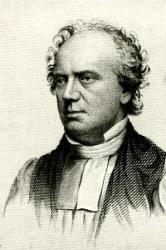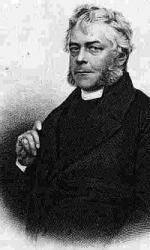
1804 - 1851 Person Name: Rev. William Croswell, 1804-1851 Hymnal Number: 912 Author of "Lord, lead the way the Saviour went" in The Clifton Chapel Collection of "Psalms, Hymns, and Spiritual Songs" Crosswell, William, D.D., was born at Hudson, N.Y., Nov. 7, 1804; graduated at Yale College, 1822; entered for a time upon law studies, but eventually he entered Hartford College as a Theological Student, and then took Holy Orders in the Protestant Episcopal Church in 1829. In 1829 he became Rector of Christ Church, Boston; in 1840, of St. Peter's, Auburn, New York; and in 1844, of the Church of the Advent, Boston. Died suddenly at Boston, Nov. 9, 1851. Whilst at Hartford he assisted, during 1827-28, in editing The Watchman, and contributed to it many of his poetical pieces. His Memoir was written by his father, the Rev. Dr. Crosswell, of New Haven; and his Poems, collected by his father, were edited, with a short Memoir, by Dr. (now Bishop) Coxe, and published at Boston in 1800. Of his hymns the folowing are in common use:—
1. Lord, go with us, and we go. Journeying. This in Hymns for the Church and Home, 1860, No. 212, is a portion of his "Traveller's Hymn," first published in 1833. Concerning it Dr. Coxe says, "When on a journey with him, I reminded him of his 'Traveller's Hymn,' which I had seen but could not remember; and he told me, if I recollect aright, that it was a sort of Impromptu, which bubbled up when he was going with Dr. Wainwright from Boston to New York to attend the General Convention" (Memoir, p. xlii.); and in his notes, p. 282, he indirectly fixes the date of composition as 1832. Orig. text in 2 stanzas of 8 lines, in Poems, p. 255.
2. Lord, lead the way the Saviour went. For Sisters of Mercy. Written in 1831 for the Howard Benevolent Society of Boston. Dr. Coxe has entitled it "Hymn forSisters of Mercy," and says he "ventured to give it a name suited to the present state of the Church, in which Deaconesses and Sisters of Mercy are among other realizations of the poet's ardent hopes. Perhaps we owe them to his faithful prayers." (Notes to the Poems, p. 283.) It is generally accepted as the best American hymn for benevolent occasions. Original text, Poems, p. 256.
3. Now gird your patient loins again. Advent. This hymn for Advent is in 3 stanzas of 4 lines. Poems, p. 209; Hymns for Church and Home, No. 55.
4. 0 Saviour, leave us not alone. Lent. This is from his hymn for Lent beginning, "Thou who, for forty days and nights," in 4 stanzas of 4 double lines. In its abbreviated form it is found in Hymns for Church and Home, No. 85. Original in Poems, p. 219, in 4 stanzas of 4 double lines.
5. We come not with a costly store. Epiphany. For the Epiphany, from his Poems, p. 215, and based upon the Gospel of the day, in 2 stanzas of 8 lines.
6. And now the solemn rite is past. Ordination. This is composed of stanzas vii., viii. of his poem, "The Ordinal," in Poems, pp. 69-71, slightly altered. "The Ordinal" was written in 1828, and describes minutely his own ordination at his father's church, at New Haven, and the feel¬ings inspired, by the solemnity. It was printed in The Watchman, 1828. (Poems, Preface, p. xxvii.) The portion given as "And now the solemn rite is past" was included in Hall's Mitre, 1836.
Dr. Crosswell also translated the "Veni, Creator Spiritus" as "Creator, Spirit, come and bless us." His hymns are mostly unknown to the English collections. [Rev. F. M. Bird, M.A.]
--John Julian, Dictionary of Hymnology (1907)
=================
Crosswell, W., p. 269, ii. On the title-page of his Poems, 1861, this author is given as W. Croswell, and the best authorities are in favour of this spelling of the name.
--John Julian, Dictionary of Hymnology, New Supplement (1907)
William Crosswell


 My Starred Hymns
My Starred Hymns







